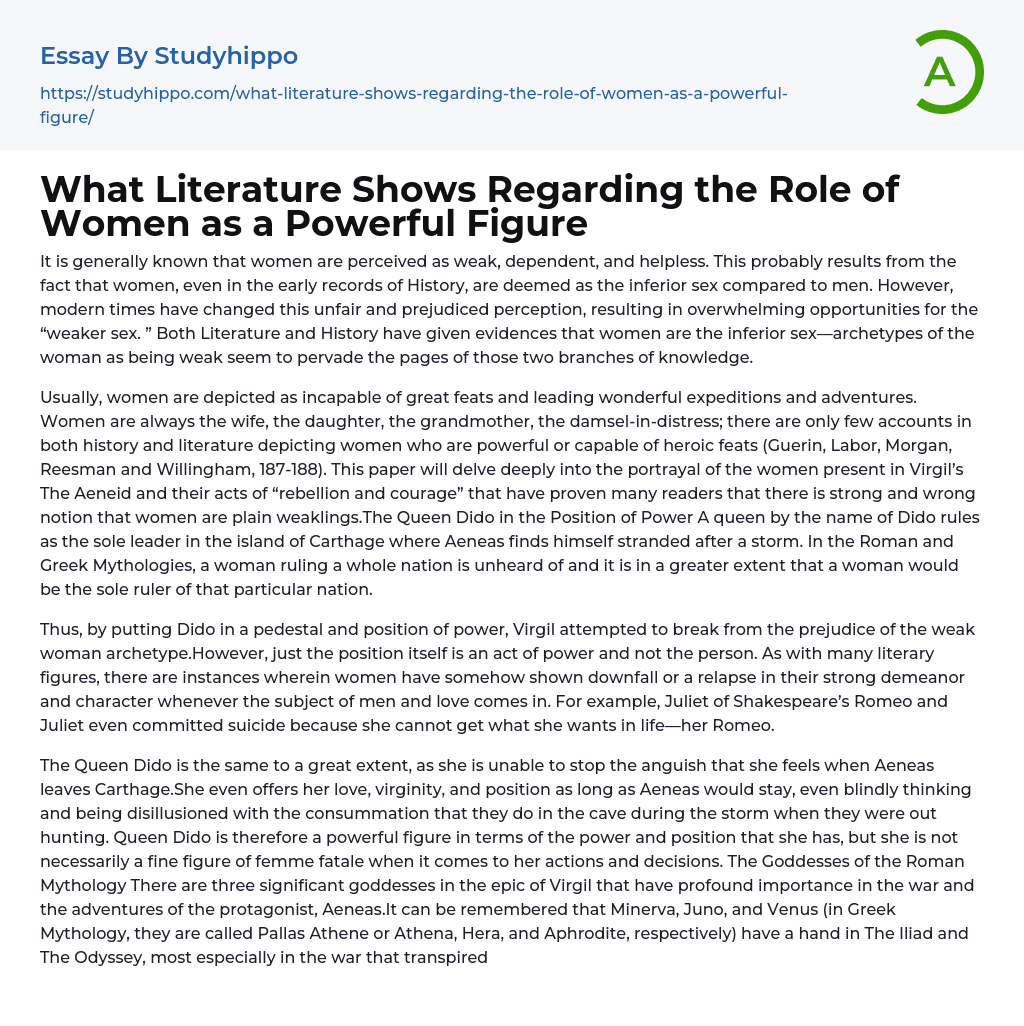

What Literature Shows Regarding the Role of Women as a Powerful Figure Essay Example
Throughout history, women have been viewed as weak, dependent, and helpless due to their perceived inferiority to men. This unjust perception has been prevalent since early historical records, but modern times have brought about significant change and greater opportunities for women. The portrayal of women as weak is evident in literary and historical archetypes.
The common depiction of women as incapable of great feats or leading expeditions and adventures is evident in both history and literature. Women are often portrayed as mere wives, daughters, grandmothers or damsels-in-distress with only a few instances of them being depicted as powerful or capable of heroic acts (Guerin, Labor, Morgan, Reesman and Willingham, 187-188). However, this paper will delve into the portrayal of women in Virgil's The Aeneid and their acts of "rebellion and courage" to challenge this b
...elief. Specifically, the paper focuses on Queen Dido who rules as the sole leader of the island of Carthage where Aeneas finds himself stranded after a storm. The fact that a woman is the sole ruler of a nation is uncommon in both Roman and Greek Mythologies.
Virgil attempted to challenge the stereotype of weak women by depicting Dido as powerful and elevated. However, it is important to note that this position of power is simply an act, rather than a reflection of the individual's true strength. Unfortunately, many literary women are portrayed as succumbing to love and men, leading to a loss of their once-strong identity. Shakespeare's Juliet, for instance, ultimately committed suicide due to unfulfilled love for her Romeo.
Queen Dido experiences great agony when Aeneas departs from Carthage, similar to the immense suffering she endures. Despite being disappointe
with their cave meeting during a stormy hunt, she offers him her affection, virginity, and position in the hopes of persuading him to stay. Although possessing significant power and prestige, her actions do not classify her as a true femme fatale. In Virgil's epic poem, Minerva, Juno, and Venus (also known as Pallas Athene or Athena, Hera and Aphrodite in Greek mythology) play pivotal roles in both Aeneas' adventures and the war. The gods and goddesses of Mount Olympus similarly determine the fate of the Romans just like they do in The Iliad and The Odyssey.
The role of fate and destiny in the story of Aeneas is influenced by a conflict among three goddesses, who have significant control over the protagonist's life and the epic's plot. Despite their background presence, these powerful women play a crucial part throughout. Queen Dido's power, for instance, stems solely from her position and also highlights this notion.
The power of Juno over her husband and her persuasive tactics demonstrate that she possesses some form of power. Similarly, Aphrodite convinces Neptune and Vulcan to aid Aeneas and protect him, displaying her ability to influence other gods. These goddesses use their wit, intelligence, and persuasion to rally powerful beings to their causes. Within the epic poem, two women defy expectations of womanhood and exhibit great power: Queen Amata, co-ruler of Laurentum alongside King Latinus, and her daughter Lavinia. Queen Amata is loyal to her people and advocates for Turnus, her daughter’s suitor alongside Aeneas.
The most significant aspect of her character is her strong advocacy for Italians to serve their own interests. Meanwhile, Lavinia holds remarkable power as she has the
authority to decide the fate of her people. Historically, political alliances were often established through marriages to princesses or heirs, and this is also the case for Lavinia. Her marriage will determine the leadership of Laurentum, proving that she has the highest position of power among all the women discussed in this paper. She has control over the future of Aeneas, the protagonist, and ultimately, the hope of the fallen Trojans. In conclusion, despite women's historical mistreatment, some defied norms and demonstrated incredible power.
While there are still instances where women are regarded as inferior, exemplified by Estes' assertion in her book that women were treated like property and infantilized during her generation, literary characters such as goddesses and Queen Dido offer a counterpoint.
- Trojan War essays
- Apollo essays
- Iliad essays
- Achilles essays
- Odysseus essays
- Oedipus essays
- Hercules essays
- Myths essays
- Zeus essays
- Gilgamesh essays
- Creation Myth essays
- Creation Vs Evolution essays
- American Literature essays
- Between The World and Me essays
- Book Report essays
- Book Review essays
- Book Summary essays
- Books essays
- Character essays
- Coming of Age essays
- Dante's Inferno essays
- Everyday Use essays
- Flowers for Algernon essays
- Genre essays
- Greek Mythology essays
- Incidents in The Life of a Slave Girl essays
- Letter essays
- Literary Criticism essays
- Literary devices essays
- Literature Review essays
- Metaphor essays
- Myth essays
- Play essays
- Plot essays
- Poem essays
- Poetry Analysis essays
- Protagonist essays
- Reader essays
- Reason essays
- Rhetoric essays
- Rhetorical Question essays
- Rhyme essays
- Simile essays
- Tragic Hero essays
- Translation essays
- Understanding essays
- Utopia essays
- Villain essays
- Writer essays
- Agriculture essays



